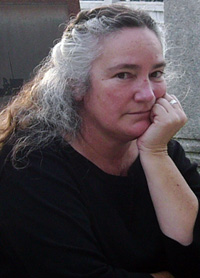A book co-written by Barbara Rose Johnston, an occasional lecturer at UC Santa Cruz, has been selected for Outstanding Scholarship in Medical Anthropology by the Society for Medical Anthropology, a division of the American Anthropological Association.
In giving the book its "New Millennium Award," the society called The Consequential Damages of Nuclear War – The Rongelap Report (Left Coast Press, 2008) "the most significant and potentially influential contribution to medical anthropology."
Written with Holly M. Barker, an anthropologist at the University of Washington, the book tracks the consequences of U.S. nuclear weapons testing in the Marshall Islands during the 1940s and 1950s. Johnston and Barker examine the experiences of the people who lived on Rongelap and other Marshallese atolls in the U.S. Pacific Proving Grounds, located about halfway between Hawaii and Australia. They investigate what it means to experience radioactive fallout as it moves through the marine and terrestrial environment, into the food chain, through the human body, and subsequent generations.
The book includes a summation of evidence Johnston and Barker submitted to the Marshall Islands Nuclear Claims Tribunal that helped support a $1.34 billion judgment for the people of Rongelap for damages associated with environmental contamination, human radiation experimentation, and loss of a way life, an award that the U.S. has yet to pay. Consequential Damages of Nuclear War was nominated last year by a University of Arizona public health professor who saw the work to be especially relevant in the aftermath of the nuclear disaster in Fukushima, Japan last April.
Johnston is a public anthropologist whose science and human rights work has been sponsored by the Center for Political Ecology in Santa Cruz, and is frequent speaker at universities across the nation. At UCSC, she has lectured at College Eight, and in environmental studies and sociology, most recently in sociology in fall 2010 while also serving as a sociology research associate.
Johnston is editor of a new book, Water, Cultural Diversity and Global Environmental Change: Emerging Trends, Sustainable Futures? (January 2012) published by UNESCO/Jakarta and Springer/Netherlands, and the Center for Political Ecology.
Lecturer's book named Outstanding Scholarship in Medical Anthropology



